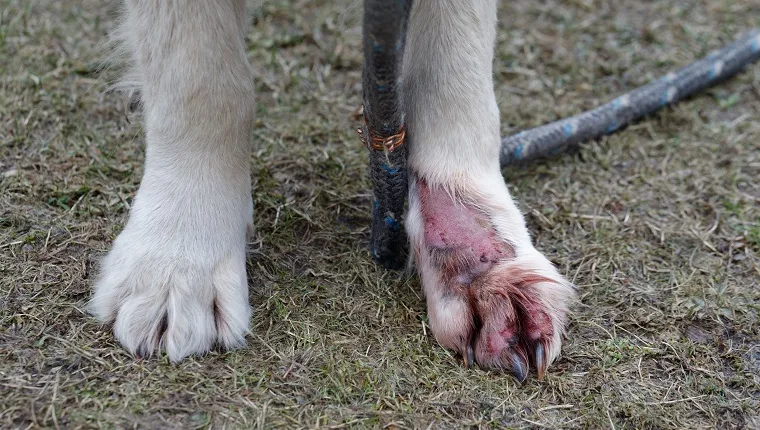Necrolytic dermatitis in dogs is a degenerative medical condition that causes a dog’s skin cells to deteriorate. It’s caused by higher-than-normal levels of the hormone glucagon, as well as deficiencies of amino acids, zinc, and essential fatty acids.
While the condition is relatively rare in dogs, it can result in the presence of lesions on the skin.
If you see signs that your dog might be suffering form any kind of skin condition, then you must consult your veterinarian for a proper diagnosis and advice. Here’s what you should know about the symptoms, causes, and treatments of necrolytic dermatitis in dogs.
Symptoms Of Necrolytic Dermatitis In Dogs
Necrolytic dermatitis in dogs is a condition that affects the skin, usually on or around the eyes, muzzle, paws, and genitals.
Some of the most frequently seen symptoms include:
- Sores
- Ulcers
- Abrasions
- Losing hair
- Acting lethargic
- Red patches of skin
- Skin that’s hardened
Causes Of Necrolytic Dermatitis In Dogs

The precise cause of necrolytic dermatitis in dogs is sometimes not known, so it’s often referred to as being idiopathic. However, veterinarians sometimes link nutritional imbalance to the condition.
Additionally, some of the other factors that veterinarians suspect to cause the condition include:
- High glucagon levels in the blood
- Diabetes
- Zinc deficiency
- Cushing’s disease
- Liver issues
- Amino acid deficiency
- Pancreatic tumor
- Long-term use of certain seizure medications
Veterinary Treatments
If you suspect that your dog is suffering from necrolytic dermatitis, then your veterinarian want to carry out a full physical examination of your dog.
They’ll carry out comprehensive blood tests, as well as a urine analysis. In some cases, vets may also recommend a biopsy of any skin lesions.
When it comes to treatment, the primary goal is to treat the underlying cause of the condition. In extreme cases involving an issue with the liver, dogs might need a further spell of hospitalization. However, vets can often treat cases on an outpatient basis.
In many instances, vets also recommend making dietary changes; your vet can help you to formulate a safe and correct diet for your dog.
Has your dog ever developed necrolytic dermatitis? What advice did your vet recommend to help your dog recover? Tell us all about it in the comments below.









